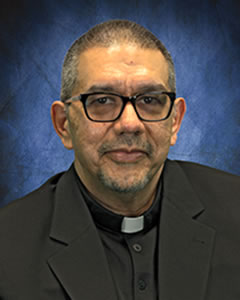
From the Director
The famous anthropologist Margaret Mead once reminded an audience that the progress made internationally after World War II brought an abrupt end to the colonial era: “There is no longer such thing as a second-class human being.” One of her more famous quotations is, “Never doubt a small group of thoughtful, committed citizens can change the world; indeed, it’s the only thing that ever has.” My thought is that Jesus’ choosing twelve and sending them out is a prime example of a small group that brought about monumental change.
 Why would I start off the first director’s column of the year with that call to action? Well, another famous speaker, “Daddy King,” Dr. Martin Luther King, has a birthday on January 15. Although he died tragically many years ago, the power of King’s oratory is still prophetically holding up a mirror to our society. Why are his words so powerful? They draw not only on our country’s founding documents, but on Biblical themes.
Why would I start off the first director’s column of the year with that call to action? Well, another famous speaker, “Daddy King,” Dr. Martin Luther King, has a birthday on January 15. Although he died tragically many years ago, the power of King’s oratory is still prophetically holding up a mirror to our society. Why are his words so powerful? They draw not only on our country’s founding documents, but on Biblical themes.
All these centuries after apostolic times, belonging to a Church community is still empowering. When we see something that needs improvement, change, or some sort of action, we need not say, “What can I do? I am only one person.” When we belong to a parish or other believing community, we are part of a group of motivated people with a commitment to doing the right thing, indeed doing the will of God.
Our Christian commitment should be a force for positive change. If we need justification for being active, we can find it in the letter of St. James, “Be doers of the word and not hearers only, deluding yourselves. For if anyone is a hearer of the word and not a doer, he is like a man who looks at his own face in a mirror. He sees himself, then goes off and promptly forgets what he looked like.” A spiritual way of looking at ourselves in a mirror can be an examination of conscience, peering into our own lives and trying to discern where the values that guide us came from. Did we ever have conversations about race with our parents, grandparents? Did we just overhear adults talking about issues of race, whether in a positive way or a negative way?
When we belong to a parish or other believing community, we are part of a group of motivated people with a commitment to doing the right thing, indeed doing the will of God.
When we compare how society operates with the ideal of equal justice under the law, too often we don’t like what we see. And do we turn away and try to just move on or do we try to develop a more acute sense of fairness and empathy?
Looking back over the last year, I wonder how many of us have been actually doing much about addressing the issue of racism in America and in our hearts. What have we seen in our souls and how have we processed that information?
There is so much work to be done, between racial groups, between generations, between men and women. Am I an ambassador of friendship and good will? Let us endeavor to better communicate and invite participation in ministries and programs that bring people closer to the challenges faced by the marginalized people affected by the multiple forms of injustice in society.